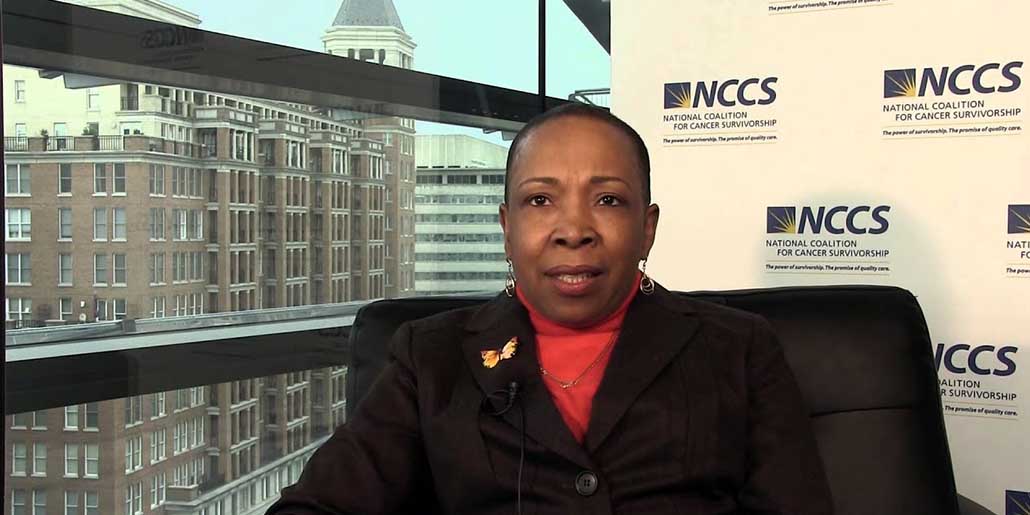
NCCS Policy and Advocacy Manager Kelsey Nepote Attends and Presents at CancerCon: Takeaways and Steps for Moving Forward
Over the weekend, I had the pleasure of attending and presenting at Stupid Cancer CancerCon in Denver, Colorado. Stupid Cancer is the largest US-based charity that comprehensively addresses young adult cancer through advocacy, research, support, outreach, awareness, mobile health, and social media. CancerCon is their yearly conference and social networking ...

Marlene King Discusses Living with Metastatic Breast Cancer and Collaborative Decision-Making with Her Oncologist
Marlene King was diagnosed with Ductal Carcinoma in Situ (DCIS) in 2008 at the age of 48, and she elected to have a lumpectomy, chemotherapy and radiation. After treatments the cancer seemed to be in remission. In 2011, the cancer returned and she decided it would be best to have to a double ...

Guest Video: Dr. Susan Gubar Discusses the Financial Burdens of Cancer Care
This video post is part of the 2015 Cancer Policy Matters “The Imperatives for Quality Cancer Care: 20 Years Later” blog series. The third principle from the Imperatives for Quality Cancer Care states, “Standards of cancer care should be driven by the quality of care, not only by the cost of care, ...

Decision-Making in Cancer Care: Communication (INFOGRAPHIC)
The second principle of the Imperatives for Quality Cancer Care states, “Quality cancer care should be available in a health care system whose standards and guidelines are developed in consideration of treating the whole person with cancer. Health care plans must regard the cancer patient as an autonomous individual who has the right to ...

Guest Post by Dr. Don Dizon: When Even the Best Advice Isn’t Good Enough
Every so often I see a patient who views cancer as a constant threat to be handled — it becomes so significant that it is as if she can never let her guard down. I always worry about this, partly because that singular focus on fighting cancer can sometimes detract ...

WCOE: Elaine Schattner Reflects on David Carr and Survivorship, Oncology Payment Reform, Patient Perspectives
What Caught Our Eye (WCOE) Each week, we recap the cancer policy articles, studies, and stories that caught our attention. Reflection On The Death Of David Carr, And Cancer Survivorship, by @ElaineSchattner - https://t.co/6m4TfQE8Ul via @forbes— Elaine Schattner MD, MA (@ESchattner) February 19, 2015 Is CMS Oncology Payment Reform Model "A Toe ...

Guest Post from The Cancer Support Community: Progress Made in Addressing the Psychosocial Needs of People Diagnosed with Cancer
This guest post is part of the 2015 Cancer Policy Matters "The Imperatives for Quality Cancer Care: 20 Years Later" blog series. Although noted in the literature as early as the 1970’s, serving as the foundation for the 1982 establishment of The Wellness Community (now The Cancer Support Community) and certainly ...

Treating the Whole Person: Understanding and Gaining Access to Palliative Care
As part of our 20 Years Later blog series, NCCS CEO Shelley Fuld Nasso discusses the difference between palliative and end-of-life care, as well as barriers to palliative care in this video. The second principle from the Imperatives for Quality Cancer Care states, “Quality cancer care should be available in ...

Being Mortal Is Far From Being Morbid: Responding to FRONTLINE’s Profile of Surgeon Atul Gawande and End of Life Care
On public television stations nationwide, the award-winning FRONTLINE series aired a program on February 10th based on the work of noted surgeon and writer, Atul Gawande. In addition to Gawande's many clinical and surgical talents, he has the rare gift of writing articles and books for all of us, no ...

Revisiting the Second Principle of the Imperatives for Quality Cancer Care—Treating the Whole Person
This month, as part of the 20 Years Later series, we are revisiting the second principle of the Imperatives for Quality Cancer Care: Access, Advocacy, and Accountability. The second principle states, “Quality cancer care should be available in a health care system whose standards and guidelines are developed in consideration ...

